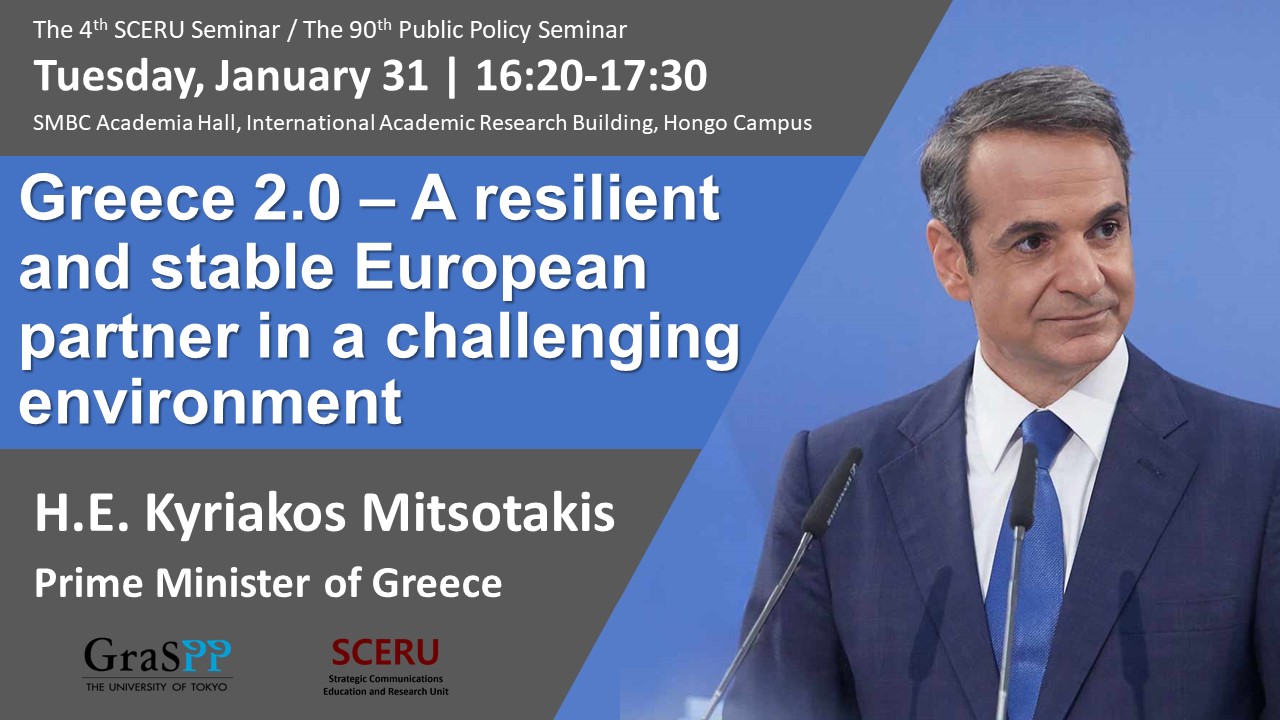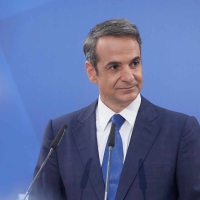Greece 2.0 – A resilient and stable European partner in a challenging environment

Details
| Type | Lecture |
|---|---|
| Intended for | General public / Enrolled students / International students / Alumni / Companies / University students / Academic and Administrative Staff |
| Date(s) | January 31, 2023 16:20 — 17:30 |
| Location | Hongo Area Campus |
| Venue | SMBC Academia Hall, 4th floor, International Academic Research Building, Hongo Campus Building map Access to Hongo Campus |
| Capacity | 70 people |
| Entrance Fee | No charge |
| Registration Method | Advance registration required
Please register here. |
| Registration Period | January 16, 2023 — January 31, 2023 |
| Contact | graspp_eventinfo"at"pp.u-tokyo.ac.jp (Please replace "at" with @) |
The 4th SCERU Seminar/The 90th Public Policy Seminar:
The Prime Minister of Greece
“Greece 2.0 – A resilient and stable European partner in a challenging environment”
Prime Minister Mitsotakis will present his vision about propelling Greece, with renewed ambition, at the forefront of European and international developments. He will highlight how, after a decade-long financial crisis, Greek society has demonstrated resilience to populism and has regained confidence and dynamism. He will further explain how ambitious reforms have restored normalcy and revived the economy. In this vein, he will refer to key macroeconomic indicators, record investment inflows, the positive outlook for the Greek economy, despite the energy crisis and the inflationary pressures. The Prime Minister will also refer to his government’s track record in effective crisis management (pandemic, Russian aggression against Ukraine, energy and food crises) and to its contribution to key EU/NATO policies and Greece’s proactive foreign policy.Language:
English
Program:
Opening remarks by Dean Keisuke Iida, Graduate School of Public Policy
Speech by Kyriakos Mitsotakis, Prime Minister of Greece
Chaired by Professor Chiyuki Aoi, Graduate School of Public Policy/SCERU
About the speaker:

Kyriakos Mitsotakis was sworn in as Prime Minister of the Hellenic Republic on July 8th, 2019.
President of Nea Demokratia since January 2016, managed to modernize his party, renew and boost its membership base, create a system of funding based on small annual donations by the members, and put in place a code of transparency and accountability in the operations of the party.
He led his party to a landslide victory three years later, campaigning on a platform for jobs, strong growth, and lower taxes. Nea Demokratia was the first party to win an absolute majority in the Greek Parliament since 2009.
As Minister of Administrative Reform and e-Government from June 2013 until January 2015, he spearheaded comprehensive national reforms by implementing a functional reorganization of institutions, structures, and processes.
A member of the Parliament since 2004, Kyriakos Mitsotakis has participated in the Committee for Constitutional Amendment, the Committee for Trade and the Committee for National Defense. He was also an active member of the NATO Parliamentary Assembly.
As Chairman of the Environment Committee between 2007-2009, he passionately pursued issues pertaining to climate change and advocated for the need for environmentally sustainable growth. Since then, he was the shadow-minister for the environment and climate change for Nea Demokratia until 2012.
Before entering politics, he worked for ten years in the private sector as a financial analyst with Chase Investment Bank, a consultant with McKinsey and Company, and finally as CEO of NBG Venture Capital at the National Bank of Greece.
He obtained his bachelor’s degree in Social Studies, summa cum laude, from Harvard University, and earned an MA in International Relations from Stanford University and an MBA from Harvard Business School.
About SCERU:
The Graduate School of Public Policy (GraSPP) at the University of Tokyo, with European Union (EU) support, has established a Strategic Communications Education and Research Unit for conducting a collaborative programme on research and education on Strategic Communication. The Unit will organize teaching, public research, and professional seminars on Strategic Communications, with a particular focus on bringing together perspectives and professional experiences from Europe and Japan. Through the work of the programme, Japanese and European perspectives on Strategic Communication can be shared, reinforcing the EU-Japan strategic partnership, and supporting efforts to overcome common problems including the rise of disinformation and foreign information manipulation and interference (FIMI).






